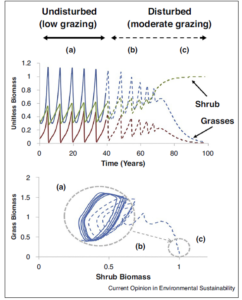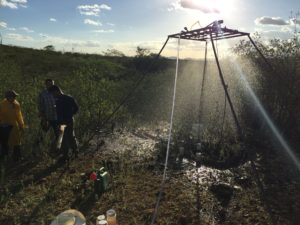A new paper commenting on the emerging frameworks for mitigating Woody Plant Encroachment (WPE) was just published in the journal ‘Current Opinion in Environmental Sustainability’. The focus of the paper is understanding savannas (woody plant encroachment) under the Alternative Stable State Theory (ASST). As the authors revisit some of key conceptual models of ASST laid down by John Anderies and Marten Scheffer, the paper strongly emphasizes on acknowledging pyric herbivory and fire together as stabilizing forces for sustaining a grassland. The observations regarding shifts in the two feedback cycles sustaining a grassland have been summarized through illustrations which also bring to surface the point that such changes related to a woodland state are always realized with a time-lag and that triggers for such changes may lie well in the past.
As we still remain from fully understanding drivers of woody encroachment and reconcile these changes in ‘endogenous’ factors along with changes in the ‘exogenous’ factors – this article lays forth a strong argument for considering the role of pyric-herbivory and fire in not just understanding but also manage woody plant encroachment.
The authors on the paper include Dr. Brad Wilcox, Dr. Andrew Birt, Dr. Sam Fuhlendorf and Dr. Steven Archer. This work came together as a result of their collaborative effort on the NSF-CHNS project – “Woody Plant Encroachment in the Southern Great Plains”.
https://www.sciencedirect.com/science/article/pii/S1877343517302506

